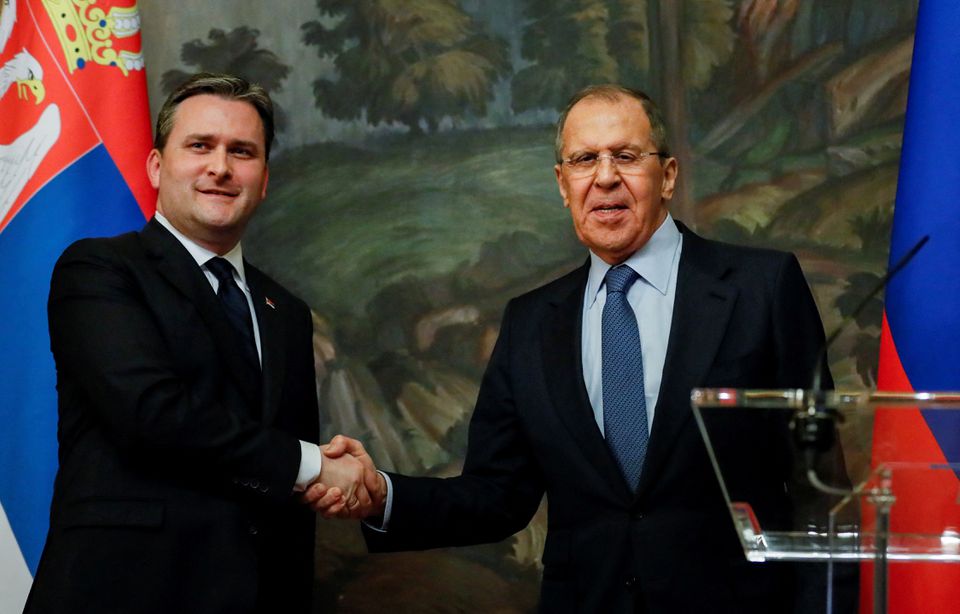
Russia’s Deputy Foreign Minister Alexander Grushko discussed overcoming the consequences of the confrontational policy of the West with the leadership of Serbia at the talks in Belgrade, the Russian Foreign Ministry said on Saturday.
“Issues of bilateral cooperation were discussed with an emphasis on strengthening the Russian-Serbian strategic partnership in the context of the growing global crisis. The parties focused on joint work to ensure stability in the Balkans and overcome the consequences of the confrontational policy of the West,” the ministry said.

Grushko said earlier in an interview with TASS he believes that Serbia suffers unprecedented pressure that goes beyond the framework of civilized international communication.
“We know perfectly well what unprecedented pressure Serbia faces now. This pressure goes beyond the framework of civilized international communication, but we appreciate that the Serbian leadership is acting in accordance with national interests,” Grushko said.
EU and US worries
The European Union (EU) and United States envoys had, late September, expressed dismay at Serbia’s decision to sign a two-year pledge to consult with Moscow as much of the West seeks to isolate Russia over its escalating war on Ukraine.
Moscow’s closest ally in the Balkans even as it pursues EU membership, Belgrade has condemned Russia’s unprovoked invasion but staunchly resisted joining unprecedented Western sanctions that would curb trade, energy shipments, direct flights, and other links.
Alongside Russian Foreign Minister Sergei Lavrov on September 23, Serbian Foreign Minister Nikola Selakovic announced his signing of a “Plan of Consultations” through 2024 on the sidelines of the UN General Assembly in New York.
U.S. Ambassador to Serbia Christopher Hill said at a conference at Belgrade’s Metropol Hotel on September 26 that “the United States would like to hear some clarification of what this agreement or what this protocol really was.”
He said the U.S. side had “some of the best discussions we’ve had” with the Serbian delegation on “big-picture and small-picture issues” during last week’s General Assembly before learning of the protocol’s signing. Hill said he hadn’t seen the document’s precise contents.
“To be very frank, nobody should be signing anything with Russia right now, and frankly no one is signing very much with Russia, except perhaps some very poor recruits who are being forced into this mobilization to support this failing military operation that Russia has launched against its neighbor,” Hill said.
“It is hard for us to understand, but we do look forward to hearing some kind of clarification of what it is,” he said of the document and Belgrade’s relations with Moscow. “We want to know what the bedrock is of the relationship with a country that does things like that.”
Hill said the United States supported Serbia’s effort to achieve greater integration into the West and its EU membership goal, and encouraged Serbian energy diversification away from Russia.
At the same conference, EU Ambassador to Serbia Emmanuel Joffre said the bloc “expects Serbia to stand by it in defense of European values and international law.”
“By signing the agreement on cooperation with Russia, Serbia sent a completely opposite message, regardless of the fact that it said it would not recognize the results of the referendum that Russia is conducting on the occupied territory of Ukraine,” Zoffre said.
He noted that Serbia is on the path to EU membership and is expected to harmonize its foreign policy with the EU’s, including the introduction of sanctions against Russia.
The Serbian Foreign Ministry described the consultation protocol as a “technical document,” and Selakovic suggested it contained no commitments on security issues but rather bilateral and multilateral activities.
Serbian opposition parties quickly condemned the move by the government of Selakovic and President Aleksandar Vucic’s ruling Progressive Party (SNS) and its nationalist allies.
Serbia has kept close relations with Russia in particular to bolster its refusal to recognize the 2008 declaration of sovereignty by its former province Kosovo, which is now recognized by more than 100 countries.
But it has frequently balanced those diplomatic ties, along with Moscow’s provisions of energy and weapons, with deeper trade and economic ties to EU member states in addition to talks on joining the bloc.
Back in Belgrade on September 25, Selakovic announced that Serbia would not recognize the voting that Russia and its separatist allies have staged in occupied parts of Ukraine on September 23-27, citing Serbia’s commitment to the UN Charter and respect for international law, among other things.
Recognizing what Kyiv and Western governments have called “sham” referendums “would completely violate our national and state interests, the preservation of sovereignty and territorial integrity and the inviolability of borders,” Selakovic said.
We understand West’s pressures on Serbia – Russia
“We know perfectly well what unprecedented pressure Serbia faces now. This pressure goes beyond the framework of civilized international communication, but we appreciate that the Serbian leadership is acting in accordance with national interests,” Grushko said.








